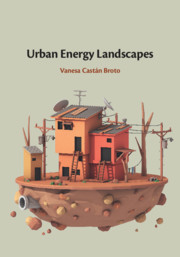Crossref Citations
This Book has been
cited by the following publications. This list is generated based on data provided by Crossref.
Castán Broto, Vanesa
2020.
Climate change politics and the urban contexts of messy governmentalities.
Territory, Politics, Governance,
Vol. 8,
Issue. 2,
p.
241.
Bouzarovski, Stefan
2020.
Transforming Urban Energy Demand: A Timely Challenge.
Frontiers in Sustainable Cities,
Vol. 2,
Issue. ,
Castán Broto, Vanesa
Mah, Daphne
Zhang, Fangzhu
Huang, Ping
Lo, Kevin
and
Westman, Linda
2020.
Spatiotemporal perspectives on urban energy transitions: a comparative study of three cities in China.
Urban Transformations,
Vol. 2,
Issue. 1,
Patterson, James J.
2020.
Climate Urbanism.
p.
97.
Kirshner, Joshua
Broto, Vanesa Castán
and
Baptista, Idalina
2020.
Energy landscapes in Mozambique: The role of the extractive industries in a post-conflict environment.
Environment and Planning A: Economy and Space,
Vol. 52,
Issue. 6,
p.
1051.
Long, Joshua
Rice, Jennifer L.
and
Levenda, Anthony
2020.
Climate Urbanism.
p.
31.
Ayala, Manuel
Huaraca, Diego
Varela-Aldás, José
Ordóñez, Andrea
and
Riba, Genís
2020.
Anthropization and Growth of the Electricity Grid as Variables for the Analysis of Urban Infrastructure.
Sustainability,
Vol. 12,
Issue. 4,
p.
1486.
Castán Broto, Vanesa
and
Robin, Enora
2021.
Climate urbanism as critical urban theory.
Urban Geography,
Vol. 42,
Issue. 6,
p.
715.
De Laurentis, Carla
and
Pearson, Peter J. G.
2021.
Policy-relevant insights for regional renewable energy deployment.
Energy, Sustainability and Society,
Vol. 11,
Issue. 1,
Robin, Enora
and
Broto, Vanesa Castán
2021.
TOWARDS A POSTCOLONIAL PERSPECTIVE ON CLIMATE URBANISM.
International Journal of Urban and Regional Research,
Vol. 45,
Issue. 5,
p.
869.
Unnikrishnan, Hita
B., Manjunatha
Nagendra, Harini
and
Castán Broto, Vanesa
2021.
Water governance and the colonial urban project: the Dharmambudhi lake in Bengaluru, India.
Urban Geography,
Vol. 42,
Issue. 3,
p.
263.
Robb, Douglas
Cole, Harrison
Baka, Jennifer
and
Bakker, Karen
2021.
Visualizing water‐energy nexus landscapes.
WIREs Water,
Vol. 8,
Issue. 6,
De Laurentis, Carla
2021.
What are the regionally specific institutions that matter for renewable energy deployment and how can they be identified? Some insights from Italian regions.
Local Environment,
Vol. 26,
Issue. 5,
p.
632.
Huang, Ping
Westman, Linda
and
Castán Broto, Vanesa
2021.
A culture‐led approach to understanding energy transitions in China: The correlative epistemology.
Transactions of the Institute of British Geographers,
Vol. 46,
Issue. 4,
p.
900.
Pihl, Erik
Alfredsson, Eva
Bengtsson, Magnus
Bowen, Kathryn J.
Cástan Broto, Vanesa
Chou, Kuei Tien
Cleugh, Helen
Ebi, Kristie
Edwards, Clea M.
Fisher, Eleanor
Friedlingstein, Pierre
Godoy-Faúndez, Alex
Gupta, Mukesh
Harrington, Alexandra R.
Hayes, Katie
Hayward, Bronwyn M.
Hebden, Sophie R.
Hickmann, Thomas
Hugelius, Gustaf
Ilyina, Tatiana
Jackson, Robert B.
Keenan, Trevor F.
Lambino, Ria A.
Leuzinger, Sebastian
Malmaeus, Mikael
McDonald, Robert I.
McMichael, Celia
Miller, Clark A.
Muratori, Matteo
Nagabhatla, Nidhi
Nagendra, Harini
Passarello, Cristian
Penuelas, Josep
Pongratz, Julia
Rockström, Johan
Romero-Lankao, Patricia
Roy, Joyashree
Scaife, Adam A.
Schlosser, Peter
Schuur, Edward
Scobie, Michelle
Sherwood, Steven C.
Sioen, Giles B.
Skovgaard, Jakob
Sobenes Obregon, Edgardo A.
Sonntag, Sebastian
Spangenberg, Joachim H.
Spijkers, Otto
Srivastava, Leena
Stammer, Detlef B.
Torres, Pedro H. C.
Turetsky, Merritt R.
Ukkola, Anna M.
van Vuuren, Detlef P.
Voigt, Christina
Wannous, Chadia
and
Zelinka, Mark D.
2021.
Ten new insights in climate science 2020 – a horizon scan.
Global Sustainability,
Vol. 4,
Issue. ,
Affolderbach, Julia
2022.
Translating green economy concepts into practice: ideas pitches as learning tools for sustainability education.
Journal of Geography in Higher Education,
Vol. 46,
Issue. 1,
p.
43.
Fox, Sean
and
Goodfellow, Tom
2022.
On the conditions of ‘late urbanisation’.
Urban Studies,
Vol. 59,
Issue. 10,
p.
1959.
Harrison, Conor
2022.
Electricity capital and accumulation strategies in the U.S. electricity system.
Environment and Planning E: Nature and Space,
Vol. 5,
Issue. 4,
p.
1716.
Farina, Almo
2022.
Principles and Methods in Landscape Ecology.
Vol. 31,
Issue. ,
p.
339.
Bouzarovski, Stefan
and
Robinson, Caitlin
2022.
Injustices at the air–energy nexus.
Environment and Planning F,
Vol. 1,
Issue. 2-4,
p.
168.



